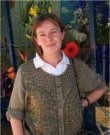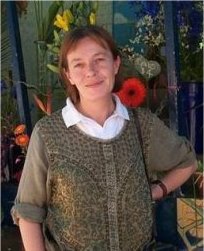AUSTRALIAN POETS AT WORK SERIES 2
Tatjana Lukic
Selected by Coral Hull

[Above] Photo of Tatjana Lukic by Karen Bachelor, 2003.
CH: Why is poetry important to you?
TL: I discovered poetry early in life, as soon as I learned to read and write. It became the main way I express myself and communicate with others, the way I think, learn and see the world. Many other things are discovered early in life, but why poetry became the most important to me, I do not know.
CH: Where is your favourite place and why?
TL: There is not just one place. My favourite places have always been somewhere else, where I am not at the moment, somewhere where I might go or might not go at all. At the same time, any corner in the world is good enough for me to feel at home. A Bjelave balcony in Sarajevo, old stairs in Ohrid, a bench in a Launceston park ... are only some of them.
CH: What is the hardest thing you've ever had to do?
TL: Writing poetry in English is one of the hardest and most challenging things I have done. It is not easy, it's often bloody hard to find the right word, but I have never preferred easy things anyway. The joy of writing in this language is unique.
CH: If you could do lunch with anyone who would it be?
TL: When it comes to poets, for example, I favour reading their books while having lunch on my own. However, over the years two poets became like close friends although I have never met them in person: now a well known Polish poet Wislawa Szymborska and Croatian poet Danijel Dragojevic. I love and respect a lot not only what they write but the way they have lived their lives. Both are very private, quiet and simple people, old but still with more questions about the world than answers to offer. A lunch with them would be a special treat.
CH: Name what is most important to you?
TL: There is nothing more important to me than the future of my child. It means the whole lot, the world we are creating and leaving to our children.
CH: What are your primary concerns regarding the world?
TL: The rich get richer and the poor get poorer, as everybody knows.
CH: Do you believe in a power greater than yourself?
TL: I am very stubborn and I don't surrender easily to any idea of power greater than myself, although of course, I know it is everywhere. It does not matter if I believe in it or not, it is there: just around the corner, up on the hill, where our little gods are sitting and playing with us and our environment as they like.
CH: What makes you happy?
TL: A dream about a sunny morning under my fig tree full of birds, reading a paper with no war news whatsoever.
| |
sunball
when she got a place
up in the cemetery at the east
where the sun still appeared
and he got his spot
in the small yard on the west knoll
a grave on his own
and when they did not wake up
from death, did not rave
on the crosses and stars
stuck to their names
which cut their bedhead in half
i knew they were up to something
they would never surrender like that
mum and dad were cheeky folk
they made their own game of sunball
rolling the sun from one hill to another
above the town, catching the ball from
dawn till dusk, and all over again,
they made sure the fun was going on
far more fun than if they laid next to each other
and argued for ever: who got more soggy soil under
the arm, whose tree makes better shade up there,
above the crypt
shooting exams
defence lessons were twice per week, squeezed between
latin and history of art, compulsory as everything else, in a
classroom lined with the cupboards full of shiny shotguns
they were rather useless, these lectures on patriotism, war
tactics and weapons, especially in springtime, when all
windows were opened and we forgot easily about the
resistance, invaded by a splash of blossom from a troop of
cherry trees in a schoolyard
only at the end of a session when we played with our m42s,
blood returned to the pimpled cheeks, we cleaned,
disassembled, and fit again each rifle into a precious toy,
shiny and cold as a jeweller's cherished stone
the exams were a joy we waited for, the whole day spent in
a shooting field at the entrance of the town, rolling on the
ground and sweating, targeting an enemy grinning from a
row of black circles, it was real and more exciting than the
kissing games we dreamed about
and it was the only time my magic craft actually worked,
how i managed to cheat i can't explain, but it was always
done well: laying still with my rifle pressed to the right spot
on the hot arm, both eyes closed all the time, firing blindly
at a distance and shaking, i got the best marks, sometimes
even more hits to the centre than i shot
a trembling carabineer, getting old i remember hardly any
drill, o tempora, o mores is all that survives, and a wonder
turning the eyes to dark holes of the sky: who is a blind
master hitting faithfully every night
another falling star?
morning coffee
make a coffee for me, darling, and i will come
to lie down next to you ...
bosnian folk song
she just turned on the hotplate to boil water for coffee, and
arranged two small cups, spoons and a sugar bowl on the plate,
he was reading an old paper at his place at the table, facing
a glass balcony door
a church tower and a mosque were leaning towards their
kitchen window, searching for someone alive, the town was
empty down there, everyone ran to the forests last night,
the storm is coming, they cried, and they are gone, he felt he
had to say it again, why should we leave, our home is here, and
this is not our war, he repeated quietly, she nodded and opened
a coffee jar, where should we go, anyway, she didn't say it, he
lit a cigarette for her, and one for himself, and then
it happened,
a man stormed in,
a pointed machine gun crashed through the door, a boy, twenty, twenty
two, no more, in full uniform, stared at them as he saw two sitting
ghosts, who are you, and what are you doing here, it sounded like a
shouted command, but he from his place at the table calmly said we are
at home having our coffee, she nodded, and threw a cigarette into an
ashtray, this is it, this is the end,
she didn't say it
but followed the next order, stood up and turned to the wall next to the
fridge, the boy's gun pushed her hard, she stayed still and cold, looking
at the fading bluish paint, you are in your home, yeah, oldies, have some
fun in your home, the boy stepped back to the door and fired one, two, six
shots, how many she was not sure, all around her into the wall, the
kitchen was shaking, or was it hell already, she did not know, could not
turn around, even when it all stopped and the boy said that's enough,
let's have coffee now, dropped the gun under the table, and sat next to
him, who was gazing at the balcony door
a year later she just turned on the hot plate to make coffee, and walked
to the balcony to water the flowers, he was sitting at his place at the
table, reading the paper, but when she came back, he was on the floor,
lying next to the fridge, still, his face bluish, already cold, all of a
sudden,
just like that,
gone
ad
olive skin/dark eyes
young at body and heart
new in the town/no ties
came by sea in good health
never homesick/sincere/gentle/and honest
educated by all means/all alone/good at listening/slow at talks
good sense of humour/better sense of sorrow/don't pray at midday
all possessions mobile/work hard/day and night/sleep in spare time
hardly ever dream/prefer all food/like to try all things new/smoke
if there is a chance/sometimes suddenly cry/then again laugh/would like to sing and dance
or just walk with you
it will take time but ALA/all letters answered
quiet neighbour/trusting mate/never ever kissed in this land
'i just want to fall in love'
Acknowledgments to: Stylus Poetry Journal (Australia), Splatter (Australia) and SubtleTea.com (USA). |
About the Poet Tatjana Lukic

|
Tatjana Lukic is an Australian with a strong Slavic accent. Born in Croatia, she lived in Bosnia, Croatia, Serbia and Czech Republic before migrating to Australia in 1992. She studied philosophy and sociology in Sarajevo, and worked as a college teacher, poetry editor and sociologist/researcher. In the 80s she published four books of poetry in the former Yugoslavia, and won a few national awards. She writes and translates poetry and lives in Canberra and works as a researcher for a government department. Her publications include (Poetry Collections in Croatian): Saslusanje (Nolit, Belgrade, 1988), Izbor (Mali katalog poezije, Osijek, 1985), Sta sutim (Svjetlost, Sarajevo, 1984), Povijedanje, zacetak poja (Matica srpska, Novi Sad, 1981). |
[Above] Photo of Tatjana Lukic by Karen Bachelor, 2003.
I Next I
Back I
Exit I
Thylazine No.12 (June, 2007) |



